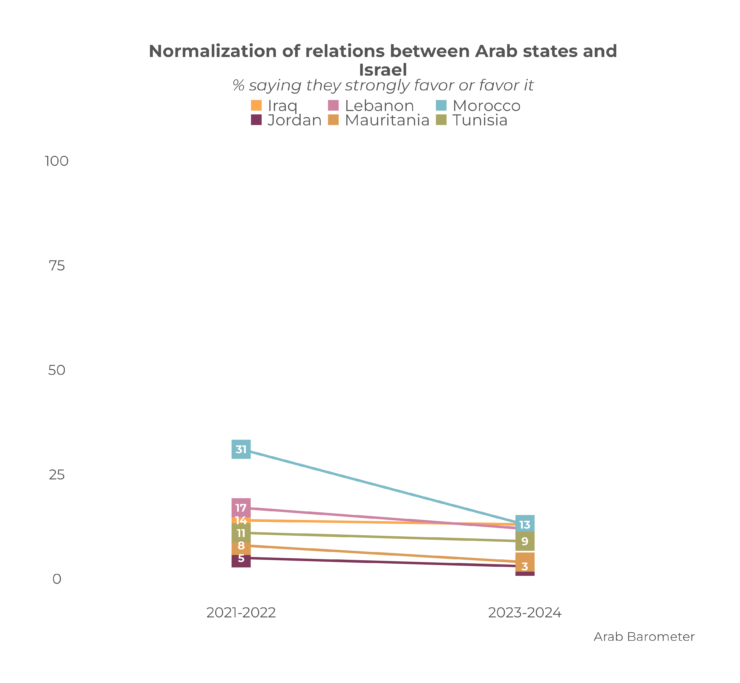In 2020, the Trump administration secured normalization agreements between Israel and four Arab countries – Bahrain, Morocco, Sudan, and the United Arab Emirates – marking a significant shift in regional relations and sparking a public discussion across the Middle East and North Africa (MENA). The deals were complex, not only secured peace with Israel but included changes in U.S. policy that were long desired by the citizens of the affected countries. For example, Morocco’s long-standing claim to sovereignty over the disputed territory of Western Sahara was recognized by the U.S. and the U.S. removed Sudan from the list of state-sponsors of terrorism.
A key goal of the Abraham Accords was to build a “warm peace” between Israel and the four Arab countries, which is part of what inspired the American sponsors to make these policy changes. Going forward, the architects hoped that through economic integration and cultural engagement, Israel would be viewed more positively by publics in these countries. Additionally, these agreements were also designed to spread to new countries, with Saudi Arabia being the main target.
The goal of a warm peace was designed to contrast with the lessons of past agreements. Prior to 2020, only two members of the Arab League had normalized relations with Israel. Egypt signed a peace treaty in 1979 while Jordan did so in 1994. Yet, relations between these countries remain fraught. Despite cooperation between the governments on issues such as security, the respective populations of Jordan and Egypt have not warmed to their shared neighbor. In fact, after the Abraham Accords were reached, Jordanians and Egyptians were among the least likely out of 12 publics surveyed to favor the normalization of relations with Israel. Only five percent within each country said they favored or strongly favored this process.
Initial data from Arab Barometer 2021-2022 on views of the Abraham Accords suggested that the idea of a warm piece might be possible, at least in two of the countries that normalized relations. Support for normalization was significantly higher in Morocco (31 percent) and Sudan (39 percent) about a year after the agreements were signed than it was in other countries. The primary reason for this difference appears to be linked to educational attainment. In both countries, those with a college degree were significantly more likely to favor normalization compared with those with a secondary degree or less. In Morocco, the gap was 28 points while in Sudan it was 13. It appears that those who were more likely to be aware of the full benefits of the agreements, meaning changing policies relating to Western Sahara and the state sponsor of terrorism list, were also more likely to support normalization in both countries.
These agreements did not appear to have a meaningful effect in the other countries surveyed in 2021-2022. In seven of these nine countries, at most 11 percent were in favor of this process. The two exceptions were Lebanon (17 percent) and Iraq (14 percent). In both countries, the slightly more favorable attitudes came down to specific communities. In Lebanon, 38 percent of Christians favored normalization compared with only five percent of Muslims. In Iraq, 29 percent of Kurds favored normalization compared with 12 percent of the remaining population.

In the post-October 7 world, perceptions have once again changed. In none of the seven countries surveyed by Arab Barometer in 2023-2024 do more than 13 percent of citizens say they are in favor of normalization. In most countries, the level represents a small decline from an already low level of support. However, in Morocco this level has plummeted from 31 percent to 13 percent. Moroccans are now no more likely to support normalization than Iraqis or Lebanese. Any hopes of a “warm peace” have dramatically cooled. This change appears almost entirely linked with the war in Gaza. Among those Moroccans who say that the best way to describe Israel’s military campaign is a “genocide”, only nine percent favor normalization. Among those who describe it at a “conflict”, 31 percent are in favor of normalization, which is the same level as for all Moroccans before October 7.
Unfortunately, due to the civil war in Sudan, it has not been possible to conduct a new survey in this country. We also do not have data for Bahrain or the UAE to examine any potential changes there. But, Morocco offers a cautionary example for hopes for the future of normalization. The war in Gaza has fundamentally shifted attitudes about normalization. The horrific images coming out of Gaza have been witnessed in Morocco and across MENA turning those who were once supportive of peace agreements with Israel to opponents.
A warm peace would always have been difficult, but in the current circumstances it appears impossible to achieve between Israel and Arab countries. Renewed efforts to extend the Abraham Accords to Saudi Arabia or other countries will face significant obstacles. Ordinary people across MENA are not ready to embrace peace with Israel, at least without a dignified outcome for the Palestinians. As previously demonstrated, MENA publics are more supportive of a two-state solution compared to before October 7, suggesting a warm peace would only have a chance after the establishment of an independent Palestinian state. Until that time, even if the Abraham Accords were to be extended, the most likely outcome would be a cold peace similar to the ones that exist between Israel and both Jordan and Egypt.



